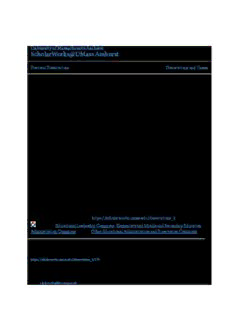Table Of ContentUUnniivveerrssiittyy ooff MMaassssaacchhuusseettttss AAmmhheerrsstt
SScchhoollaarrWWoorrkkss@@UUMMaassss AAmmhheerrsstt
Doctoral Dissertations Dissertations and Theses
November 2014
TThhee MMaassssaacchhuusseettttss EEdduuccaattoorr EEvvaalluuaattiioonn FFrraammeewwoorrkk aanndd
TTrraannssffoorrmmaattiioonnaall LLeeaaddeerrsshhiipp AAlliiggnnmmeenntt:: AAnn IInnvveessttiiggaattiioonn
Martin J. McEvoy Jr
University of Massachusetts Amherst
Follow this and additional works at: https://scholarworks.umass.edu/dissertations_2
Part of the Educational Leadership Commons, Elementary and Middle and Secondary Education
Administration Commons, and the Other Educational Administration and Supervision Commons
RReeccoommmmeennddeedd CCiittaattiioonn
McEvoy, Martin J. Jr, "The Massachusetts Educator Evaluation Framework and Transformational
Leadership Alignment: An Investigation" (2014). Doctoral Dissertations. 274.
https://doi.org/10.7275/5771454.0 https://scholarworks.umass.edu/dissertations_2/274
This Open Access Dissertation is brought to you for free and open access by the Dissertations and Theses at
ScholarWorks@UMass Amherst. It has been accepted for inclusion in Doctoral Dissertations by an authorized
administrator of ScholarWorks@UMass Amherst. For more information, please contact
[email protected].
THE MASSACHUSETTS EDUCATOR EVALUATION FRAMEWORK AND
TRANSFORMATIONAL LEADERSHIP ALIGNMENT: AN INVESTIGATION
A Dissertation Presented
by
MARTIN J. MCEVOY, JR.
Submitted to the Graduate School of the
University of Massachusetts Amherst in partial fulfillment
of the requirements for the degree of
DOCTOR OF EDUCATION
September 2014
College of Education
© Copyright by Martin J. McEvoy, Jr. 2014
All Rights Reserved
THE MASSACHUSETTS EDUCATOR EVALUATION FRAMEWORK AND
TRANSFORMATIONAL LEADERSHIP ALIGNMENT: AN INVESTIGATION
A Dissertation Presented
by
MARTIN JAMES MCEVOY, JR.
Approved as to style and content by:
_______________________________________
Sharon F. Rallis, Chair
_______________________________________
Kathryn A. McDermott, Member
_______________________________________
Melissa S. Woodard, Member
____________________________________
Christine B. McCormick, Dean
College of Education
DEDICATION
In memory of my loving parents, Martin James McEvoy, Sr., and Geraldine C. McEvoy.
I miss them every day.
With the deepest gratitude to my wife Jane Keiderling McEvoy, who I love, cherish,
admire, and respect more than she could ever know.
Thanks to Finola Larkin McEvoy for her support and interest in my project.
ACKNOWLEDGMENTS
I am indebted to Committee Chair Dr. Sharon Rallis and Drs. Kathryn McDermott and
Melissa Woodard for their teaching, inspiration, guidance, and support.
I would also like to heartily thank Linda Guthrie for tirelessly and professionally
answering all of my questions as I tried to navigate the doctoral program, and Elisa
Campbell and Susan Mellin who skillfully and readily assisted with the formatting of this
document. Much sincere thanks, too, to the participants in this study. Finally, I wish to
thank my friends and colleagues over the years.
v
ABSTRACT
THE MASSACHUSETTS EDUCATOR EVALUATION FRAMEWORK AND
TRANSFORMATIONAL LEADERSHIP ALIGNMENT:
AN INVESTIGATION
SEPTEMBER 2014
MARTIN JAMES MCEVOY, JR., B.A., MASSACHUSETTS COLLEGE
OF LIBERAL ARTS
M.A., WESTERN NEW ENGLAND UNIVERSITY
C.A.G.S., UNIVERSITY OF MASSACHUSETTS AMHERST
Ed.D., UNIVERSITY OF MASSACHUSETTS AMHERST
Directed by: Professor Sharon F. Rallis
The recent Massachusetts Educator Evaluation Regulations (CMR 35.00)
articulates goals that include growth and improved performance by teachers. Despite this
stated goal, however, it is unclear if the policy is consistent with transformational
leadership, which has shown correlation with growth and performance. In fact, the policy
may instead bring about unintended consequences associated by some with evaluations in
general, such as promoting “inspectional and fault finding supervision . . . [that] has
serious consequences for the improvement of teaching and student achievement” (Glanz,
2005, p. 3). Through a discursive analysis of the Educator Evaluation Regulations (CMR
35.00) and semi-structured interviews with teachers and school leaders, this qualitative
study investigates the alignment of transformational leadership theory to the evaluation
regulations as written and as understood by teachers and educational leaders. In addition,
drawing from the disciplines of psychology, communications, and organizational theory,
a new transformational leadership model is presented. The conceptualization of
vi
transformational leadership theory serves as both an analytical framework for this study
and responds to calls made by prominent transformational leadership theoreticians such
as Bass and Riggio (2006) and Burns (1978) to explicate the theory’s inner mechanisms.
vii
TABLE OF CONTENTS
Page
ACKNOWLEDGMENTS ...................................................................................................v
ABSTRACT ....................................................................................................................... vi
LIST OF TABLES ...............................................................................................................x
LIST OF FIGURES ........................................................................................................... xi
CHAPTER
I. INTRODUCTION ...................................................................................................1
General Introduction ................................................................................................1
Background ..............................................................................................................6
Problem and Purpose ...............................................................................................7
Guiding Research Assumptions ..............................................................................8
Transformational Leadership Theory of Practice Conceptual Model ......................8
Research Questions ................................................................................................11
Potential Significance of Study ..............................................................................11
Overview ................................................................................................................13
II. LITERATURE REVIEW ......................................................................................15
Introduction ............................................................................................................15
The Importance of Perception and Environment ...................................................16
An Alternative Reality ...........................................................................................18
Transformational Leadership .................................................................................20
Transformational Leadership: A Critique ..............................................................22
Transformational Leadership Theory of Practice ..................................................25
Theory of Action: Encouragement .........................................................................26
Theory of Action: Moral Reflection ......................................................................31
Theory of Action: Relational Dialectics Theory (RDT) ........................................38
Transformational Leadership and Self-Efficacy ....................................................44
Summary of Literature Review ..............................................................................46
III. RESEARCH METHODS ......................................................................................48
Introduction ............................................................................................................48
Research Questions ................................................................................................48
Method ...................................................................................................................48
Fieldwork and Trainings ........................................................................................49
viii
Discursive Document Analysis ..............................................................................50
Qualitative Document Analysis Process ...............................................................52
Why Document Analysis?..................................................................................... 54
Semi-Structured Interviews ...................................................................................55
Interview Questions (sample) ................................................................................56
The Participants .....................................................................................................56
Analysis of Interviews ...........................................................................................57
Steps to Ensure Trustworthiness ............................................................................58
Myself as Researcher .............................................................................................60
IV. FINDINGS .............................................................................................................62
Introduction ............................................................................................................62
Introduction to Discourse Analysis ........................................................................62
CMR 35.00: A Structural Analysis ........................................................................63
Privileging through Language-in Use ....................................................................67
CMR 35.00: Standards and Indicators. ..................................................................71
3 Standards, Indicators and the TLTP. ..................................................................77
An Area of Alignment ...........................................................................................82
Action through Language ......................................................................................86
Another Alignment Area ........................................................................................90
A Caveat to Achieve Alignment ............................................................................91
The Massachussetts Educator Evaluation Regulations: As Understood ................95
Trust .......................................................................................................................96
Communication ....................................................................................................102
Goal setting ..........................................................................................................105
Summary of Chapter IV .......................................................................................109
V. DISCUSSION ......................................................................................................111
Introduction ..........................................................................................................111
Problem and Purpose ...........................................................................................111
Research Questions ..............................................................................................111
Methods................................................................................................................112
Summary of Key Findings and Their Implications for Practice ..........................113
Implications for Policy .........................................................................................121
Suggestions for Further Research....................................................................... 123
APPENDICES
A. THE MASSACHUSETTS EVALUATION REGULATIONS ......................125
B. GUIDING INTERVIEW QUESTIONS .........................................................157
C. PARTICIPANTS................................................................................... ..........160
REFERENCES ................................................................................................................161
ix
Description:McEvoy, Martin J. Jr, "The Massachusetts Educator Evaluation Framework and Transformational Leadership Alignment: An study investigates the alignment of transformational leadership theory to the evaluation in line who then relays the story to the third person in line, and so on” (p. 8). The pol

